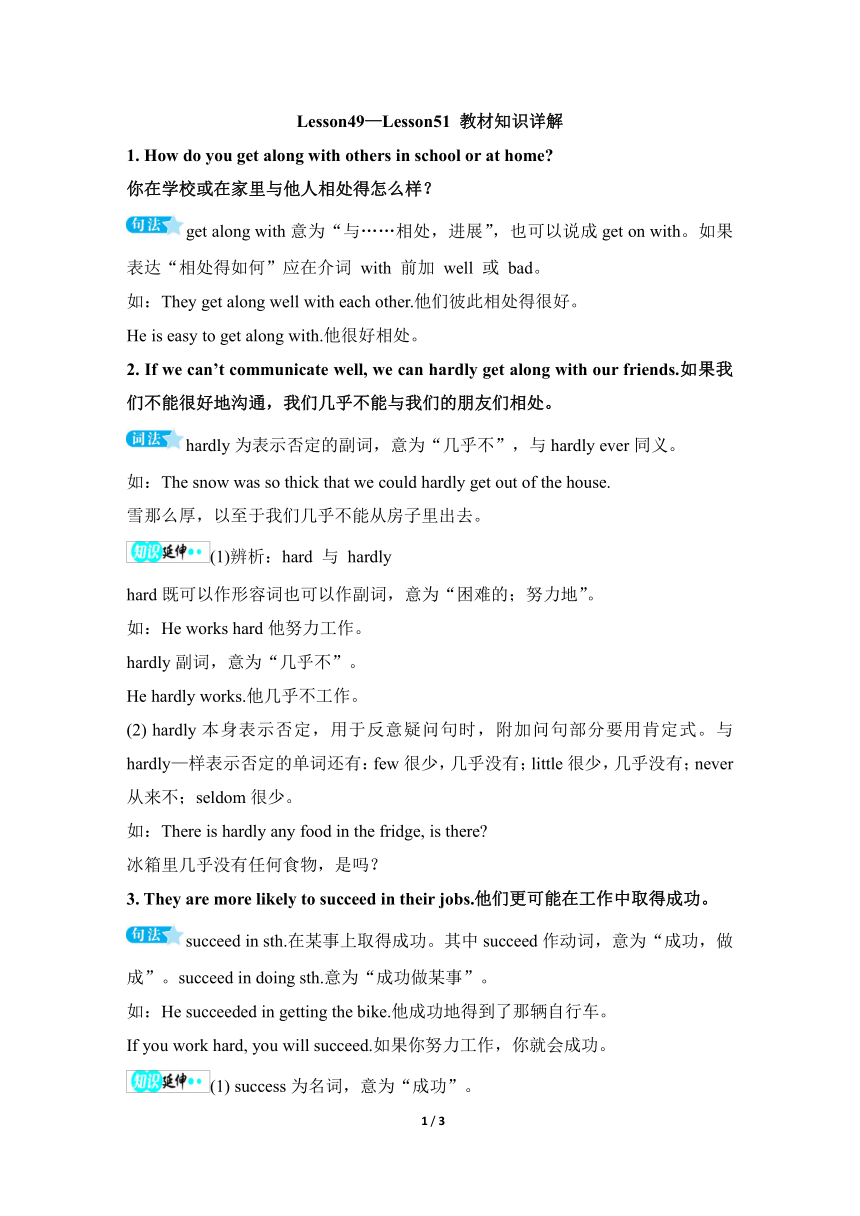冀教版九年级英语下册 Lesson49—Lesson51 教材知识详解(WORD版)
文档属性
| 名称 | 冀教版九年级英语下册 Lesson49—Lesson51 教材知识详解(WORD版) |  | |
| 格式 | doc | ||
| 文件大小 | 6.4MB | ||
| 资源类型 | 教案 | ||
| 版本资源 | 冀教版 | ||
| 科目 | 英语 | ||
| 更新时间 | 2022-06-20 17:01:03 | ||
图片预览

文档简介
Lesson49—Lesson51 教材知识详解
1. How do you get along with others in school or at home
你在学校或在家里与他人相处得怎么样?
get along with意为“与……相处,进展”,也可以说成get on with。如果表达“相处得如何”应在介词 with 前加 well 或 bad。
如:They get along well with each other.他们彼此相处得很好。
He is easy to get along with.他很好相处。
2. If we can’t communicate well, we can hardly get along with our friends.如果我们不能很好地沟通,我们几乎不能与我们的朋友们相处。
hardly为表示否定的副词,意为“几乎不”,与hardly ever同义。
如:The snow was so thick that we could hardly get out of the house.
雪那么厚,以至于我们几乎不能从房子里出去。
(1)辨析:hard 与 hardly
hard既可以作形容词也可以作副词,意为“困难的;努力地”。
如:He works hard他努力工作。
hardly副词,意为“几乎不”。
He hardly works.他几乎不工作。
(2) hardly本身表示否定,用于反意疑问句时,附加问句部分要用肯定式。与hardly—样表示否定的单词还有:few很少,几乎没有;little很少,几乎没有;never从来不;seldom很少。
如:There is hardly any food in the fridge, is there
冰箱里几乎没有任何食物,是吗?
3. They are more likely to succeed in their jobs.他们更可能在工作中取得成功。
succeed in sth.在某事上取得成功。其中succeed作动词,意为“成功,做成”。succeed in doing sth.意为“成功做某事”。
如:He succeeded in getting the bike.他成功地得到了那辆自行车。
If you work hard, you will succeed.如果你努力工作,你就会成功。
(1) success为名词,意为“成功”。
如:Failure is the mother of success.失败乃成功之母。
(2)successful为形容词,意为“成功的”。“一个成功的人”可说成a successful person。如:The performance was successful.演出很成功。
4. Then when you meet again, you will easily make that person feel comfortable if you remember his or her name.然后当你们再见面时,如果你记得他或她的名字,你会很容易使那个人感觉很舒服。
此句是由if引导的条件状语从句,从句用一般现在时,主句要用一般将来时,也可用祈使句或含有情态动词的句子。
如:If it rains tomorrow, I’ll stay at home.如果明天下雨,我将待在家里。
if还可表示“是否”,只能引导宾语从句,不能引导其他名词性从句。
如:Can you guess if the girl will buy a handbag for her mother as a present
你能猜到那个女孩是否会买一个手提包给她的妈妈作为礼物吗?
5. No one wants to waste time talking to someone who is not honest.没有人想浪费时间和不诚实的人交谈。
waste v. & n..浪费。
(1)waste作动词时既可为及物动词也可为不及物动词,反义词为save节约。waste的用法同spend类似:waste time (in) doing sth.浪费时间做某事;waste money on sb. / sth.浪费金钱在某人/某事上。
如:Don’t waste my time, Jack.杰克,别浪费我的时间。
(2)waste作名词时既可为可数名词也可为不可数名词。常用短语:a waste of…浪费……。
如:The meeting was a complete waste of time.那个会议完全是浪费时间。
6. If you set a time to meet your friends, do your best to be on time.如果你约好一个时间去见你的朋友们,要尽力准时。
①do one’s best相当于try one’s best,意为“尽某人最大的努力”,后跟动词不定式。
如:She promised me to do her best to help him.
她向我保证要尽她最大的努力帮助他。
②on time意为“按时,准时”,相当于at exactly the right time,指在预定的时间内或按规定的时间完成某事。
如:Will you attend the meeting on time 你会按时出席会议吗?
in time及时,该短语强调正好赶上事先约定的时间,而没有迟到。后面可接for引导的介词短语,表示正赶上某事。
如:They were just in time for the bus.他们正好及时赶上了那班公共汽车。
7. We used to study and play together, but ever since last Friday, she hasn’t spoken to me.我们过去常在一起学习和玩耍,但是自从上周五,她还没和我说过话。
used to do sth.意为“过去常常做某事”,表示过去习惯性、经常性的动作或状态,侧重于过去与现在的对比,暗指现在已经不存在。used无人称和时态的变化。
辨析:used to do sth.与 be used to doing sth.
(1)used to do sth.表示“过去常常做某事”,指过去经常性的动作或存在的状态,现在已不再那样,侧重于与现在的比较,to后接动词原形。
如:He used to play basketball after school.他过去常常放学后打篮球。
(2)be used to doing sth.表示“习惯于做某事”,指某动作过去不常做而现在已经习惯了,强调目前的状况,to后接名词或动名词。
如:The teacher is used to going to bed late in the evening.
那个老师习惯于晚上晚睡觉。
1 / 3
1. How do you get along with others in school or at home
你在学校或在家里与他人相处得怎么样?
get along with意为“与……相处,进展”,也可以说成get on with。如果表达“相处得如何”应在介词 with 前加 well 或 bad。
如:They get along well with each other.他们彼此相处得很好。
He is easy to get along with.他很好相处。
2. If we can’t communicate well, we can hardly get along with our friends.如果我们不能很好地沟通,我们几乎不能与我们的朋友们相处。
hardly为表示否定的副词,意为“几乎不”,与hardly ever同义。
如:The snow was so thick that we could hardly get out of the house.
雪那么厚,以至于我们几乎不能从房子里出去。
(1)辨析:hard 与 hardly
hard既可以作形容词也可以作副词,意为“困难的;努力地”。
如:He works hard他努力工作。
hardly副词,意为“几乎不”。
He hardly works.他几乎不工作。
(2) hardly本身表示否定,用于反意疑问句时,附加问句部分要用肯定式。与hardly—样表示否定的单词还有:few很少,几乎没有;little很少,几乎没有;never从来不;seldom很少。
如:There is hardly any food in the fridge, is there
冰箱里几乎没有任何食物,是吗?
3. They are more likely to succeed in their jobs.他们更可能在工作中取得成功。
succeed in sth.在某事上取得成功。其中succeed作动词,意为“成功,做成”。succeed in doing sth.意为“成功做某事”。
如:He succeeded in getting the bike.他成功地得到了那辆自行车。
If you work hard, you will succeed.如果你努力工作,你就会成功。
(1) success为名词,意为“成功”。
如:Failure is the mother of success.失败乃成功之母。
(2)successful为形容词,意为“成功的”。“一个成功的人”可说成a successful person。如:The performance was successful.演出很成功。
4. Then when you meet again, you will easily make that person feel comfortable if you remember his or her name.然后当你们再见面时,如果你记得他或她的名字,你会很容易使那个人感觉很舒服。
此句是由if引导的条件状语从句,从句用一般现在时,主句要用一般将来时,也可用祈使句或含有情态动词的句子。
如:If it rains tomorrow, I’ll stay at home.如果明天下雨,我将待在家里。
if还可表示“是否”,只能引导宾语从句,不能引导其他名词性从句。
如:Can you guess if the girl will buy a handbag for her mother as a present
你能猜到那个女孩是否会买一个手提包给她的妈妈作为礼物吗?
5. No one wants to waste time talking to someone who is not honest.没有人想浪费时间和不诚实的人交谈。
waste v. & n..浪费。
(1)waste作动词时既可为及物动词也可为不及物动词,反义词为save节约。waste的用法同spend类似:waste time (in) doing sth.浪费时间做某事;waste money on sb. / sth.浪费金钱在某人/某事上。
如:Don’t waste my time, Jack.杰克,别浪费我的时间。
(2)waste作名词时既可为可数名词也可为不可数名词。常用短语:a waste of…浪费……。
如:The meeting was a complete waste of time.那个会议完全是浪费时间。
6. If you set a time to meet your friends, do your best to be on time.如果你约好一个时间去见你的朋友们,要尽力准时。
①do one’s best相当于try one’s best,意为“尽某人最大的努力”,后跟动词不定式。
如:She promised me to do her best to help him.
她向我保证要尽她最大的努力帮助他。
②on time意为“按时,准时”,相当于at exactly the right time,指在预定的时间内或按规定的时间完成某事。
如:Will you attend the meeting on time 你会按时出席会议吗?
in time及时,该短语强调正好赶上事先约定的时间,而没有迟到。后面可接for引导的介词短语,表示正赶上某事。
如:They were just in time for the bus.他们正好及时赶上了那班公共汽车。
7. We used to study and play together, but ever since last Friday, she hasn’t spoken to me.我们过去常在一起学习和玩耍,但是自从上周五,她还没和我说过话。
used to do sth.意为“过去常常做某事”,表示过去习惯性、经常性的动作或状态,侧重于过去与现在的对比,暗指现在已经不存在。used无人称和时态的变化。
辨析:used to do sth.与 be used to doing sth.
(1)used to do sth.表示“过去常常做某事”,指过去经常性的动作或存在的状态,现在已不再那样,侧重于与现在的比较,to后接动词原形。
如:He used to play basketball after school.他过去常常放学后打篮球。
(2)be used to doing sth.表示“习惯于做某事”,指某动作过去不常做而现在已经习惯了,强调目前的状况,to后接名词或动名词。
如:The teacher is used to going to bed late in the evening.
那个老师习惯于晚上晚睡觉。
1 / 3
同课章节目录
- Unit 7 Work for Peace
- Lesson 37 Don't Fight!
- Lesson 38 Making School a Better Place
- Lesson 39 The Dove and the Olive Branch
- Lesson 40 The UN—Power of Words
- Lesson 41 Jenny's Good Advice
- Lesson 42 Peace at Last
- Unit Review
- Unit 8 Culture Shapes Us
- Lesson 43 A Visit to Chinatown
- Lesson 44 Popular Sayings
- Lesson 45 Different Manners
- Lesson 46 Home to Many Cultures
- Lesson 47 Good Manners
- Lesson 48 Supper with the Bradshaws
- Unit Review
- Unit 9 Communication
- Lesson 49 Get Along with Others
- Lesson 50 Tips for Good Communication
- Lesson 51 What Could Be Wrong?
- Lesson 52 The Power of a Smile
- Lesson 53 Working in Groups
- Lesson 54 How Embarrassing!
- Unit Review
- Unit 10 Get Ready for the Future
- Lesson 55 Look into the Future
- Lesson 56 Manage Your Time
- Lesson 57 Best Wishes
- Lesson 58 Ms.Liu's Speech
- Lesson 59 Keep Your Choices Open
- Lesson 60 Get a Good Education
- Unit Review
